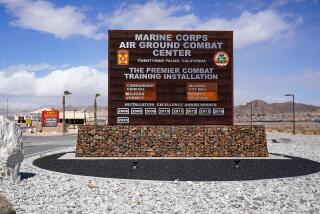Retired Marine Colonel Barred From Bases : Controversy: Brig. Gen. Wayne T. Adams permanently banishes the man he fired as his chief of staff over allegations of misuse of military planes.
EL TORO — In an extraordinary step, Brig. Gen. Wayne T. Adams has permanently banished from local Marine bases the man he fired as his chief of staff, refusing him access to the officers’ club, the golf course and other facilities usually open to retired personnel.
Col. Joseph E. Underwood, 51, was fired from his post earlier this year and later retired amid allegations that included using base planes for golfing jaunts. Adams decided last week that, because of the charges, the colonel could no longer use the air bases at El Toro or Tustin, his spokesman, Maj. Jim V. McClain, said Monday.
“He’s debarred from this base--period,” McClain said. “He is not allowed to come aboard this base,” except for medical care and commissary visits with his wife, who is ailing, he added.
“The commanding general made the determination that, by the nature of the offenses, Col. Underwood’s presence on the El Toro and Tustin bases was prejudicial to the good order and discipline and proper functioning of these two bases,” McClain said of Adams’ decision.
Adams himself is under investigation by the Marine Corps inspector general’s office for his own use of military planes during trips to Florida, Big Bear and elsewhere.
McClain would not elaborate on what caused Underwood’s banishment. Underwood, however, said he believes that it came as a result of statements he made in an article two weeks ago in The Times Orange County Edition in his first interview since his disciplining.
“It’s so petty. Why don’t they just let it go away?” Underwood complained. “They’ve already killed Col. Sabow--what do they want from me?”
Col. James E. Sabow was the assistant chief of staff at El Toro who killed himself in January, after being suspended also in connection with allegations of misuse of base planes. Underwood and Sabow’s family have charged that what they characterize as the military’s mishandling of the investigation drove Sabow to suicide.
Military officials have vigorously disputed that assertion. McClain on Monday would not discuss Underwood’s claims that he was being “harassed” in the same way that Underwood said Sabow was or that his debarment was spurred by his comments in the Times article.
Underwood, known as “the mayor” of the El Toro base during a sometimes stormy four-year stint as chief of staff, asserted in the article that he had not done anything wrong in his use of base C-12 Beechcraft planes and that Adams had reneged on promises to end the matter quietly.
Underwood also asserted that Adams himself had once ordered a plane to pick him up from a family emergency, even after Underwood had specifically told him that doing so was against regulations.
The Marine Corps is now investigating whether Adams improperly mixed personal and business trips in that case and at least four other flights he took around the country.
In the newest step of that investigation, Adams is to meet in Washington today with the Marines’ inspector general, Maj. Gen. Hollis Davison, officials said.
In his position as commander of the Marines’ western air bases, Adams maintains authority over who can and cannot use government facilities. It was with this authority that he barred Underwood, a move that officials said probably cannot be appealed through the military.
McClain said 175 people--both military and civilian--have been barred from western air bases in the last five years. He did not have a breakdown of these people by rank, but Underwood and three other military officials, in Washington and on the West Coast, said debarments of officers--much less of a colonel--are extremely rare.
“It’s an extraordinary measure for someone of his rank and time of service to be debarred from a base--it’s just not done,” said one high-ranking officer close to the case.
Underwood, a veteran of three decades’ service, said that during his time at El Toro, there were debarments “many times for criminals--drug dealers, thieves, wife beaters, attempted rapists. . . . But how many colonels have ever been barred from a base? The answer I’m sure is zero. . . .”
While Underwood was visiting the East Coast last week, the El Toro command went so far as to boot the tires on his two cars on the base to ensure that he would see the base provost marshal and pick up the letter informing him of his debarment. The letter activates the order.
Since his firing earlier this year, Underwood had been staying in base officers’ quarters for about $5 a day, and he had planned to return there when he gets back to El Toro in mid-May. As a result of his banishment, he will have to find other temporary housing until he joins his wife in a few months to begin a vacation.
He also will not be able to attend official base functions or use facilities such as the officers’ club, the golf course and other recreational sites open to retired officers. He can only use the commissary when accompanied by his wife, McClain said.
One source close to the case said that Underwood’s debarment came in part because of prodding from the Marine Commandant’s office in Washington.
The banishment had been discussed in February at the time Underwood pleaded guilty to charges against him and agreed to pay fines and restitution before his retirement. The ban was not carried out at that time. But later, people from Washington “had seen him on the golf course at El Toro” and it angered them, the source said.
More to Read
Get the L.A. Times Politics newsletter
Deeply reported insights into legislation, politics and policy from Sacramento, Washington and beyond. In your inbox three times per week.
You may occasionally receive promotional content from the Los Angeles Times.










